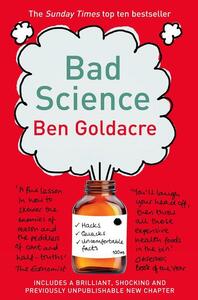You need to sign in or sign up before continuing.
Take a photo of a barcode or cover
funny
informative
lighthearted
medium-paced
„Desfiinţarea unora dintre „invenţiile” cel mai vădit pseudoştiinţifice e o modalitate excelentă de a învăţa bazele ştiinţei, în parte fiindcă ştiinţa are de-a face, în mare, cu demontarea teoriilor, dar şi pentru că lipsa cunoştinţelor ştiinţifice printre artiştii curelor-minune, promotori şi jurnalişti ne oferă câteva idei foarte simple pentru a fi supuse testării. Cunoaşterea lor ştiinţifică este rudimentară, aşa că, pe lângă greşeli elementare de raţionament, aceştia se bazează pe noţiuni precum magnetism, oxigen, apă, „energie” şi toxine: idei demne de un absolvent de gimnaziu şi bine ancorate în teritoriul
chimiei amuzante pentru copii.”
chimiei amuzante pentru copii.”
hard scientific facts + really funny = excellent book
challenging
funny
informative
reflective
medium-paced
It's pretty rare for a book to be informative, funny and worrying all at once. Such was the case for me reading "Bad Science". I had previously thought I was smart enough to tell the difference between gobbledegook and science (as the book points out though, most of us overestimate our abilities), but much of the material here came as a genuine surprise. However, now that I've read the book, I look forward to being a little less naive in future!
I read this book a couple of years ago, but it equipped me to read medical news critically.
I remember now how best to frames statistics in my own writing (always out of 1000), how to questions how 'experts' frame themselves, how the language of science is 'borrowed' to give a sense of rigour.
I remember now how best to frames statistics in my own writing (always out of 1000), how to questions how 'experts' frame themselves, how the language of science is 'borrowed' to give a sense of rigour.
Took longer to read this one just because the chapters were sometimes so hard to get through. It was by no means badly written or uninteresting, the chapters were just too long. However, it gets five stars as it has completely changed the way I view science and scientific experiments. I think this is an important read for anyone going into a health-related field.
This is a marvelous book about people getting science--mostly medical and nutritional science--really really wrong. I was struck by an amazing coincidence from the very first page. Just two weeks before I read this book, a friend described to me the foot bath that he had undergone, exactly as described in the book Bad Science. He is scientifically oriented, so he was just flabbergasted when the procedure left a brown sludge in the foot bath, but the treatment removed all the pain in his knees from some injury for a couple of weeks. He had no idea how the treatment "worked". Very likely, the placebo effect was working.
Dr. Ben Goldacre is a psychiatrist, and a weekly columnist in The Guardian. He describes many techniques for spotting "bad science". He traces the history of all sorts of wild, so-called "science-based" gimmicks, like "Brain Gym", homeopathy, anti-oxidants and nutritionists. Goldacre analyzes why people like to believe in stupid things.
Goldacre does not beat around the bush--he calls a spade a spade. He calls the pharmaceutical industry "evil". He describes dozens of subtle, hard-to-catch statistical gimmicks that are frequently used to justify licensing pharmaceutical drugs. I just loved the quote by Richard Feynman:
Goldacre traces the history of the anti-vaccine movement, starting with paper written by Dr. Anthony Wakefield on the relationship between the MMR vaccine (Measles, Mumps, Rubella) and autism in children. It was published in The Lancet in 1998. Wakefield immediately earned about $70,000 for his research, by lawyers who were suing on behalf of parents of autistic children. Eventually he was to receive ten times that much from a legal aid fund. While the paper was truly bad, Goldacre finds most of the fault in the anti-MMR scare not in the paper itself, but in the media frenzy that followed it. The media picked up the story and uncritically pushed the story to the public. Goldacre writes, "... bullshit has become an extremely important public health issue, ..." The media fail science spectacularly. While newspapers have specialized health and science correspondents who understand science, but "editors will always--cynically--sideline those people and give stupid stories to generalists, for the simple reason that they want stupid stories. Science is beyond their intellectual horizon, so they assume you can just make it up anyway."
This book is definitely eye-opening. It is well written, engaging, humorous at times, but at the same time completely serious. And, after reading this book, you will be in a far better position to objectively evaluate the quality of medical research. Highly recommended!

Dr. Ben Goldacre is a psychiatrist, and a weekly columnist in The Guardian. He describes many techniques for spotting "bad science". He traces the history of all sorts of wild, so-called "science-based" gimmicks, like "Brain Gym", homeopathy, anti-oxidants and nutritionists. Goldacre analyzes why people like to believe in stupid things.
Goldacre does not beat around the bush--he calls a spade a spade. He calls the pharmaceutical industry "evil". He describes dozens of subtle, hard-to-catch statistical gimmicks that are frequently used to justify licensing pharmaceutical drugs. I just loved the quote by Richard Feynman:
You know, the most amazing thing happened to me tonight. I was coming here, on the way to the lecture, and I came in throught the parking lot. And you won't believe what happened. I saw a car with the license plate ARW 157. Can you imagine? Of all the millions of license plates in the state, what was the chance that I would see that particular one tonight? Amazing...
Goldacre traces the history of the anti-vaccine movement, starting with paper written by Dr. Anthony Wakefield on the relationship between the MMR vaccine (Measles, Mumps, Rubella) and autism in children. It was published in The Lancet in 1998. Wakefield immediately earned about $70,000 for his research, by lawyers who were suing on behalf of parents of autistic children. Eventually he was to receive ten times that much from a legal aid fund. While the paper was truly bad, Goldacre finds most of the fault in the anti-MMR scare not in the paper itself, but in the media frenzy that followed it. The media picked up the story and uncritically pushed the story to the public. Goldacre writes, "... bullshit has become an extremely important public health issue, ..." The media fail science spectacularly. While newspapers have specialized health and science correspondents who understand science, but "editors will always--cynically--sideline those people and give stupid stories to generalists, for the simple reason that they want stupid stories. Science is beyond their intellectual horizon, so they assume you can just make it up anyway."
This book is definitely eye-opening. It is well written, engaging, humorous at times, but at the same time completely serious. And, after reading this book, you will be in a far better position to objectively evaluate the quality of medical research. Highly recommended!

funny
informative
inspiring
medium-paced
hopeful
informative
medium-paced




